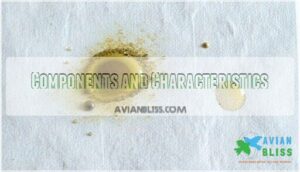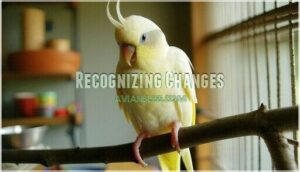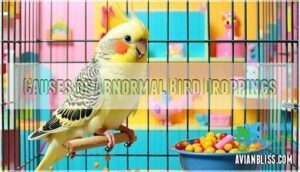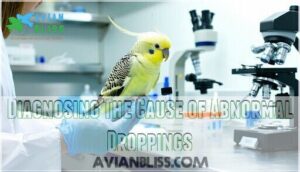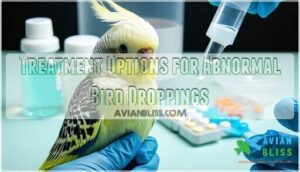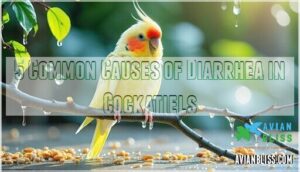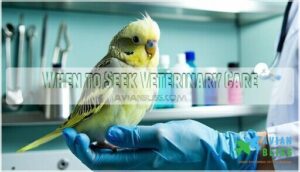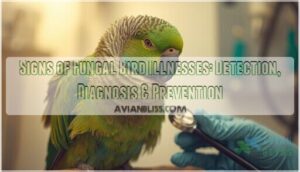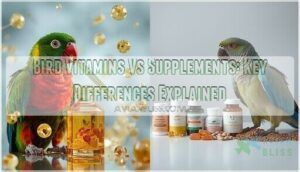This site is supported by our readers. We may earn a commission, at no cost to you, if you purchase through links.
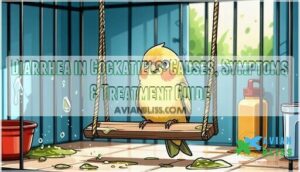 Diarrhea in cockatiels shows up as watery, loose droppings that lack the normal three-part structure you’d typically see.
Diarrhea in cockatiels shows up as watery, loose droppings that lack the normal three-part structure you’d typically see.
Your bird’s droppings should contain distinct feces, urates, and urine components.
When these become runny or lose their form, it’s often your cockatiel’s way of signaling trouble.
Common culprits include stress from environmental changes, sudden diet switches, bacterial infections, parasites, or exposure to new birds carrying pathogens.
Poor cage hygiene can also trigger digestive upset.
While occasional loose droppings might result from excitement or new foods, persistent changes lasting more than 24 hours warrant concern.
The key lies in distinguishing temporary digestive hiccups from serious underlying conditions that require immediate intervention.
Table Of Contents
- Key Takeaways
- Normal Bird Droppings
- Abnormal Bird Droppings
- Causes of Abnormal Bird Droppings
- Diagnosing The Cause of Abnormal Droppings
- Treatment Options for Abnormal Bird Droppings
- 5 Common Causes of Diarrhea in Cockatiels
- When to Seek Veterinary Care
- Frequently Asked Questions (FAQs)
- How do you treat diarrhea in birds?
- What does unhealthy cockatiel poop look like?
- Why does my bird have liquid poop?
- What is coccidiosis in cockatiels?
- What does watery poop mean for a bird?
- What is the difference between diarrhea and polyuria in cockatiels?
- What does sick cockatiel poop look like?
- What are the initial steps to take if my cockatiel has diarrhea?
- How can I prevent diarrhea in my bird?
- What are the main causes of diarrhea in cockatiels?
- Conclusion
Key Takeaways
- Monitor your cockatiel’s droppings daily – Normal droppings have three distinct parts (solid feces, white urates, clear urine), so you’ll quickly spot watery, loose stools that signal trouble.
- Don’t wait beyond 24 hours – While occasional loose droppings from stress or new foods are normal, persistent diarrhea lasting more than a day requires immediate veterinary attention.
- Address the five main causes – Stress from routine changes, sudden diet switches, poor cage hygiene, exposure to new birds without quarantine, and digestive disorders all trigger diarrhea in cockatiels.
- Take immediate action when symptoms appear – Move your bird to a warm, quiet area, remove fresh foods, provide clean water, and contact an avian veterinarian promptly for proper diagnosis and treatment.
Normal Bird Droppings
Your cockatiel’s bird droppings serve as a daily health report card.
Normal bird droppings contain three distinct components that you’ll learn to recognize.
The feces composition should be firm and green or brown in color, while the urate appearance shows as white, chalky material.
You’ll also notice clear liquid with perfect urine clarity.
Healthy indicators include consistent dropping frequency every 20-30 minutes throughout the day.
The bird feces maintains a solid texture without being too hard or too soft.
Each component remains separate and distinct in normal bird droppings.
Regular observation helps you establish your bird’s baseline patterns.
When you understand what’s normal, you can quickly spot changes that might signal health concerns.
This knowledge becomes your first line of defense in maintaining your cockatiel’s wellbeing.
Abnormal Bird Droppings
When your cockatiel’s droppings change from their normal consistency, you’ll notice loose, watery stools that lack the typical solid components.
These abnormal droppings often appear more liquid than usual and may contain undigested food particles.
Components and Characteristics
While normal droppings maintain consistent patterns, abnormal bird droppings show distinct warning signs.
You’ll spot these changes through careful observation:
- Feces Consistency: Watery droppings or loose stool instead of firm pellets
- Urate Appearance: Yellow or green discoloration rather than white chalk-like substance
- Urine Volume: Excessive clear liquid surrounding other components
These color variations and dropping frequency changes signal cockatiel diarrhea requiring attention.
Recognizing Changes
Watching your bird’s droppings closely helps you spot trouble early.
Look for changes in feces consistency, urate appearance, and urine volume.
Watery droppings or loose stool signal cockatiel diarrhea.
Color variations from normal brown-green feces indicate health issues.
Changes in dropping frequency also matter, and these cockatiel symptoms require immediate attention when they persist.
Causes of Abnormal Bird Droppings
Several factors can cause abnormal droppings in your cockatiel, ranging from health conditions to environmental changes. Understanding these causes helps you identify potential problems early and take appropriate action.
Health Conditions
Several organ system disorders can dramatically alter your cockatiel’s droppings.
Liver diseases cause greenish diarrhea from bile changes, while intestinal issues and metabolic disorders disrupt normal consistency.
Avian gastric yeast and Pacheco’s Disease are serious cockatiel illnesses requiring immediate attention.
When cockatiel symptoms appear, contact an avian vet promptly for accurate diagnosis and treatment.
Infectious Agents
Multiple bacterial infections, parasitic infections, and fungal infections can cause severe diarrhea in your cockatiel.
Avian Gastric Yeast disrupts normal digestion, while Pacheco’s Disease triggers life-threatening symptoms.
Giardiasis and Cryptosporidium spread through contaminated water sources.
These infectious agents require immediate veterinary diagnosis and targeted treatment to prevent complications.
Environmental Factors
Cage placement and environmental stressors directly impact your cockatiel’s digestive health.
Noise pollution, temperature extremes, and predator stress can trigger diarrhea episodes.
Poor bird cage hygiene creates bacterial breeding grounds, while routine changes disrupt their delicate systems.
Maintain consistent cage environment conditions, verify proper bird cage cleanliness, and establish regular bird cage maintenance schedules to prevent environmental factors from affecting your bird’s well-being.
These conditions can also expose your bird to bird droppings diseases.
Diagnosing The Cause of Abnormal Droppings
When your cockatiel shows signs of diarrhea, your veterinarian will run specific tests to identify the exact cause.
These diagnostic procedures include blood work, fecal examinations, and targeted screenings for common infections like avian gastric yeast or parasites.
Veterinary Tests
Your veterinarian will run thorough diagnostic tests to identify what’s causing your cockatiel’s diarrhea.
These veterinary tests provide essential insights into your bird’s health:
- Blood Analysis – Checks for infections, liver disease, and electrolyte imbalances
- Fecal Cytology – Identifies parasites, bacteria, and abnormal cells in droppings
- Crop Swabs – Tests for yeast infections and bacterial overgrowth
- Radiography – Reveals blockages or organ abnormalities affecting digestion
Microscopic Evaluation
Your veterinarian’s microscope becomes a detective tool, revealing hidden causes of your cockatiel’s diarrhea through detailed examination of dropping samples.
Three key microscopic tests help identify problems:
- Fecal Smears – Direct examination shows parasite identification and bacterial morphology in fresh samples
- Gram Staining – Color-coding technique distinguishes harmful bacteria types causing avian diarrhea
- Yeast Detection – Identifies fungal infections contributing to cockatiel health issues and diarrhea causes
These tests guide targeted diarrhea treatment plans.
Disease-Specific Testing
Disease marker panels deliver thorough Chlamydia Detection and Viral Identification through PCR testing.
Your vet can confirm Avian Gastric Yeast, Pacheco’s Diagnosis, and Giardia Testing from fecal samples.
These molecular diagnostics detect cockatiel disease faster than traditional methods, identifying specific pathogens causing your bird’s diarrhea within 48 hours for targeted treatment.
It’s worth mentioning that bird droppings transmit over 60 diseases.
Treatment Options for Abnormal Bird Droppings
When your cockatiel shows signs of diarrhea, effective treatment requires identifying the specific cause through veterinary diagnosis.
Your vet will create a customized treatment plan that may include antibiotics for bacterial infections, antifungals for yeast problems, or supportive care like fluid therapy to prevent dehydration.
Course of Treatment
After diagnosis, your vet creates a targeted treatment plan.
Here’s what to expect:
- Fluid therapy prevents dehydration in severe cases
- Antibiotic options target bacterial infections like Chlamydia
- Antifungal drugs treat yeast overgrowth conditions
- Dietary adjustments include easily digestible, low-fat foods
- Supportive care maintains warmth and reduces stress
Treatment duration varies by condition severity and your bird’s response.
You can find a variety of avian antibiotic treatments online.
Multifactorial Considerations
Most diarrhea in cockatiels stems from multiple interconnected causes that require combined therapies for effective treatment.
Your veterinarian will create a holistic health plan targeting stress reduction, gradual diet change, and environmental improvements simultaneously.
This thorough approach addresses immediate symptoms while implementing preventative measures for long-term wellness, ensuring your cockatiel’s digestive system recovers completely.
Exposure to droppings can lead to avian disease transmission.
Importance of Veterinary Consultation
Professional guidance becomes essential when your cockatiel shows persistent or worsening bird diarrhea symptoms. Avian veterinary care provides the expertise needed to restore your bird’s health effectively.
Expert Diagnosis helps identify specific causes through thorough testing. Your veterinarian will conduct blood work, radiographs, and microscopic examination of droppings to pinpoint the exact problem affecting your cockatiel.
Here’s what veterinary consultation offers:
- Medication Guidance guarantees proper treatment with antibiotics, antifungals, or antiparasitic drugs
- Preventative Care strategies to avoid future digestive issues
- Surgical Options when intestinal blockages require immediate intervention
- Long-Term Health monitoring through regular follow-up appointments
- Treatment adjustments based on your bird’s response to initial therapy
Don’t wait when cockatiels show signs of illness. Early bird veterinary consultation prevents complications and improves recovery outcomes substantially.
5 Common Causes of Diarrhea in Cockatiels
Diarrhea in cockatiels stems from five main causes that you’ll want to recognize quickly.
Understanding these common triggers helps you provide better care and know when to contact your veterinarian for treatment.
Stress
Environmental stressors can quickly upset your cockatiel’s digestive system.
Routine changes, vet visits, new cagemates, or predator exposure often trigger stress-induced diarrhea in sensitive birds.
Your feathered friend needs time to adjust when facing these situations.
comfort
adjustment time
Diet Changes
While stress affects your cockatiel’s digestive system, sudden changes in their diet can be equally disruptive.
Your bird’s stomach needs time to adapt when you introduce new foods or switch their regular meals.
Here’s how to manage diet changes safely:
- Gradual introduction – Add new foods slowly over 7-10 days, mixing small amounts with familiar foods
- Monitor water content – Limit high-water fruits like watermelon that can cause loose droppings
- Watch for food allergies – Remove any items that consistently trigger diet related diarrhea
- Maintain balanced diet – Keep core nutrition steady while making bird dietary changes
Proper bird diet management prevents most diet related diarrhea cases and supports healthy bird dietary habits.
A healthy diet requires specialized bird products.
Digestive Disorders
Several digestive disorders can wreak havoc on your cockatiel’s system.
Avian Gastric Yeast creates chronic inflammation, while Pacheco’s Disease attacks the digestive tract with viral force.
Giardia parasites and Cryptosporidium species colonize the intestines, causing persistent watery stools.
These bird digestive health issues require immediate veterinary diagnosis and targeted treatment protocols.
Exposure to New Birds
When introducing new birds, disease transmission becomes a real concern.
New birds can silently carry diseases that spread quickly to your flock.
Each newcomer can carry infectious agents like Salmonella, Chlamydia, or gastrointestinal parasites that cause bird diarrhea.
The introduction process requires careful quarantine procedures.
Maintain an isolation period of thirty days minimum.
Keep new birds separate with dedicated dishes and tools.
This quarantine importance can’t be overstated—it prevents disease spread by reducing pathogen transmission rates substantially through these essential preventative measures.
Hygiene
Poor cage sanitation creates the perfect breeding ground for harmful bacteria that cause diarrhea in your cockatiel.
Daily cleaning prevents fecal contamination of food and water sources. Implementing biosecurity measures can further minimize disease risks.
Essential hygiene practices include:
- Daily cage cleaning with hot soapy water to eliminate bacterial growth
- Fresh water quality checks and bowl sanitization every 24 hours
- Thorough toy cleaning and perch cleanliness to remove accumulated waste
Hand washing before handling your bird and maintaining strict bird sanitation standards protect against disease transmission.
When to Seek Veterinary Care
Recognizing when your cockatiel needs professional help can make the difference between recovery and serious complications. Don’t wait if you notice these warning signs.
Key indicators requiring immediate veterinary consultation:
- Persistent symptoms lasting over 24 hours – Diarrhea continuing beyond one day signals potential underlying health issues
- Dehydration signs and behavioral changes – Watch for lethargy, reduced appetite, or unusual posture indicating your bird’s condition is worsening
- Abnormal droppings with additional symptoms – Blood, mucus, or green coloration combined with other bird illness signs demands prompt attention
- Failed home care response – When supportive measures don’t improve your cockatiel’s condition within 12-24 hours
Prompt action is vital if you observe signs of dehydration.
Preventative checkups help catch problems early, making veterinary consultation easier and more effective for your feathered friend.
Frequently Asked Questions (FAQs)
How do you treat diarrhea in birds?
Take your bird to a vet immediately for proper diagnosis. Provide warmth, clean water, and withhold fresh produce temporarily. Clean the cage daily to prevent bacterial growth.
What does unhealthy cockatiel poop look like?
Unhealthy cockatiel droppings appear watery without solid parts, show unusual colors like black or red, contain blood or mucus, or have altered white urate consistency.
You’ll notice increased liquid frequency too.
Why does my bird have liquid poop?
Your bird’s liquid droppings usually indicate stress, diet changes, bacterial infections, or parasites. Watch for other symptoms like lethargy or appetite loss, and consult your vet promptly.
What is coccidiosis in cockatiels?
Like tiny invaders storming your cockatiel’s digestive fortress, coccidiosis is a parasitic infection caused by Coccidia protozoa.
These microscopic parasites damage intestinal walls, causing bloody diarrhea, weight loss, and lethargy in your bird.
What does watery poop mean for a bird?
Watery poop indicates your bird’s experiencing diarrhea, which signals digestive issues, infections, stress, dietary changes, or parasites requiring immediate veterinary attention for proper diagnosis.
What is the difference between diarrhea and polyuria in cockatiels?
Think of your cockatiel’s droppings as a three-part story – diarrhea means the solid chapter (feces) becomes liquid, while polyuria increases only the clear liquid ending (urine portion).
What does sick cockatiel poop look like?
Sick cockatiel droppings appear watery without solid parts, may show unusual colors like black or red, have altered white urates, or contain excessive clear liquid indicating potential health issues.
What are the initial steps to take if my cockatiel has diarrhea?
Move your bird to a quiet, warm area. Remove fresh foods, provide clean water, and monitor droppings closely. Contact your avian veterinarian immediately if diarrhea persists beyond twenty-four hours.
How can I prevent diarrhea in my bird?
Keep your cockatiel’s cage clean daily, quarantine new birds for thirty days, make gradual diet changes, provide balanced nutrition, maintain comfortable temperatures, and schedule regular veterinary checkups.
What are the main causes of diarrhea in cockatiels?
Stress from environmental changes, bacterial infections like Chlamydia, sudden diet switches, dirty cages, parasites, viral infections, temperature extremes, and introducing new birds without quarantine cause diarrhea in your cockatiel.
Conclusion
Are you prepared to act quickly when diarrhea in cockatiels strikes your feathered friend?
Monitoring your bird’s droppings daily helps catch problems early. Quick veterinary intervention prevents minor digestive issues from becoming serious health crises.
Remember that stress, diet changes, infections, and poor hygiene commonly trigger loose droppings. Don’t wait if symptoms persist beyond twenty-four hours.
Your cockatiel’s health depends on swift action and proper medical care when digestive problems arise.

